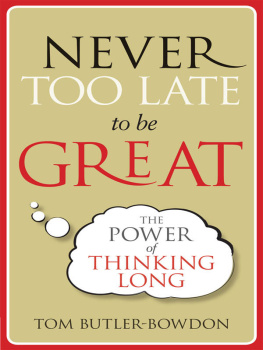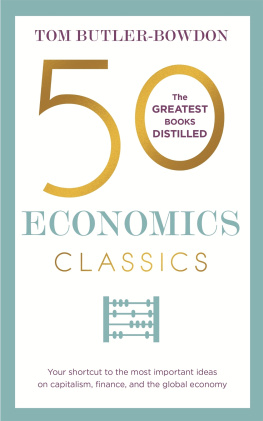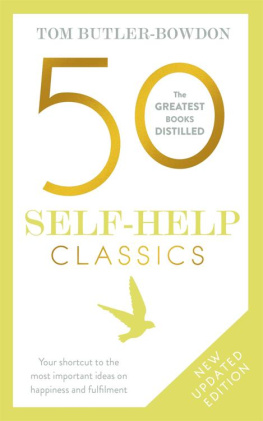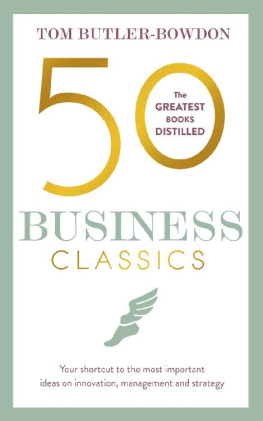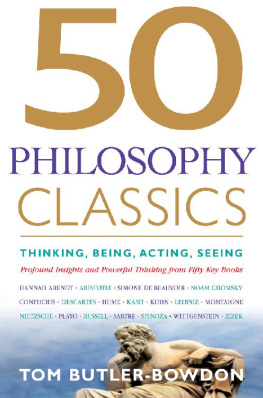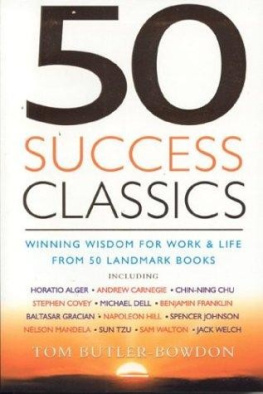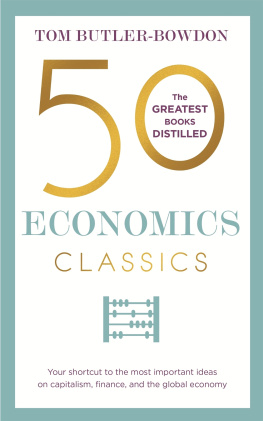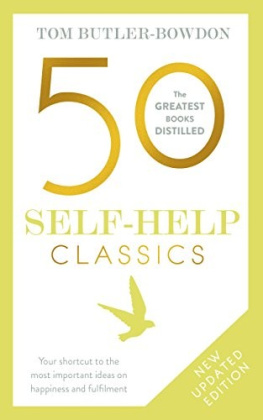TABLE OF CONTENTS
Why what youve done so far may just have set the scene
How increasing longevity is giving us multiple chances to succeed
A simple way to join the elite
Its the time in between that matters
Why many people never do anything remarkable until their fifth decade
Now for my next half-century
How many, usually without intention, save their best for last
How background shapes us, but only to a certain point
And often starts slowly
ABOUT THE AUTHOR
A graduate of the London School of Economics and the University of Sydney, Tom Butler-Bowdon was working as a political advisor in Australia when, at 25, he read his first personal development book. Captivated by the genre, at 30 he left his first career to write the bestselling 50 Self-Help Classics, the first guide to the personal development literature.
The subsequent books in this series, 50 Success Classics, 50 Spiritual Classics, 50 Psychology Classics and 50 Prosperity Classics, have been published in 22 languages. USA Today described him as a true scholar of this type of literature.
Tom has also written critical introductions to Napoleon Hills Think and Grow Rich, Sun Tzus Art of War, Machiavellis The Prince, Adam Smiths Wealth of Nations and Platos The Republic.
Visit his website at www.Butler-Bowdon.com.
The Power of Thinking Long
Tom Butler-Bowdon
For parents who patiently wait for their childs
promise to be fulfilled.
For partners who believe their loved ones
potential can be realised.
NOTE TO THE READER
You are invited to receive a free eBook, Never Too Late Extra, containing more examples and insights in relation to thinking long and slow-cooked success. To receive the bonus, just send me an email to , with Power of Thinking Long in the title bar. I look forward to hearing from you, and welcome any comments or suggestions.
Please visit my website, Butler-Bowdon.com, which has many free self-development book commentaries, interviews and other content. For news and updates follow me on Twitter @tombutlerbowdon, or befriend me on Facebook (my personal page, not the public profile).
PREFACE
At the beginning of his autobiography, the philosopher John Stuart Mill felt he needed to defend the indulgence of writing his own life story. Not having had a particularly adventurous life, he didnt feel that he was of great interest, but his famously intensive education home schooled by his father, learning Greek at three, reading all the classics by ten, advanced in mathematics by his teen years was remarkable, and he was happy to admit it.
My life certainly doesnt justify the logging of more trees, and my childhood education was in no way remarkable. However, the education I received as an adult, which fell to me by no great design, was lucky. This was the opportunity to systematically read, covering a ten-year period, hundreds of notable books in the fields of self-help, success, motivation, spirituality and psychology, to summarise their key points, and provide commentaries that put each title into the context of the whole genre, which can loosely be called self-development.
As enjoyable and inspiring as it was, the more I got into it, the more I felt the literature was lacking something, and this omission rendered it close to worthless for many people. With hindsight, I had been concerned with this missing element for most of my adult life, and only later did I see how my work and personal life had converged.
Since I was 20, I had felt like I was playing catch-up. On leaving school, like most of my friends I went on to further education, enrolling in an art college where I took courses in photography and film. My idea was to become an art photographer. However, after three years I decided that art school wasnt for me, and dropped out.
I left behind my hometown and comfortable life and started again with a new college degree in a bigger city. Now older than the other students, I felt pressure to do well to justify the decision I had made, and worked doubly hard. With no scholarships or loans, I had to pay my way with a variety of jobs that left little time for socialising.
One of these jobs was at a store selling newspapers and magazines. At the end of each week, my boss would give me the pick of the unsold stuff, and I would take them back to read in my room in a student house. One magazine really caught my attention, a title called Success. I was ambitious, but unsure about the future. I believed that successful people were a race apart, who got that way via fate or good luck. But Success told its readers that being an achiever was more a matter of decision. The hard part was allowing yourself the belief that you would be successful. Then, all that was needed was a certain amount of application and focus.
While this sounded fine, I couldnt ignore the fact that in terms of career progress, I was three years behind other people my age, and had already missed at least one important boat. But a positive outcome of this insecurity was that it led me to be interested in the age at which people made significant achievements. When reading a newspaper profile or watching a documentary, I found myself saying, Well, if he had done that by the time he was 27, how many years does that give me to do something great ? The media was full of stories of youthful success, and I didnt enjoy the contrast between these people and myself, still ploughing through university. I was delighted whenever I came across the biography of a person who had started out late, or who achieved something when a bit older. These examples let me relax a bit and focus on the tasks at hand.
I was 26 before, ensconced in my proper career job, I read my first motivational book. A couple of years later, I decided to leave this career behind and pursue what then seemed a very way out option: writing about personal development. Though I loved the field, it struck me that it was at a similar stage that biology was before Darwin, and where economics stood before Adam Smith. That is, it was a realm of knowledge largely untested by evidence, and based on the assumptions and prejudices of its early practitioners. Much of it was about transforming your life, and hopefully in as short a time as possible, yet if these techniques worked as they promised, then everyone who read the books, listened to the audios or went to the seminars should have been a superstar in a year or two. I realised how little attention was given to the role of time in the progress of an individual. On the one hand, this was almost too obvious: of course significant achievement takes many years. And yet, none of the books I read dared mention it; all were promoting a short route to success.
The vast majority of successful people I had profiled had taken years to achieve what they did. None had been overnight successes. What if, I wondered, slow-cooked success was not only the norm, but the only path to genuine achievement? If individuals only had limited spans of years allotted to them, then success was surely about the rate, pattern, sequence or trajectory of achievement as it was anything else. How long did it take for her to complete that masterpiece? What was he doing leading up to his great discovery? How old was he when he first had the idea for the company, and when did it start to prosper? If personal success was ever going to be a generic subject that could be studied, questions such as these all of which involved time should be basic.
Next page
